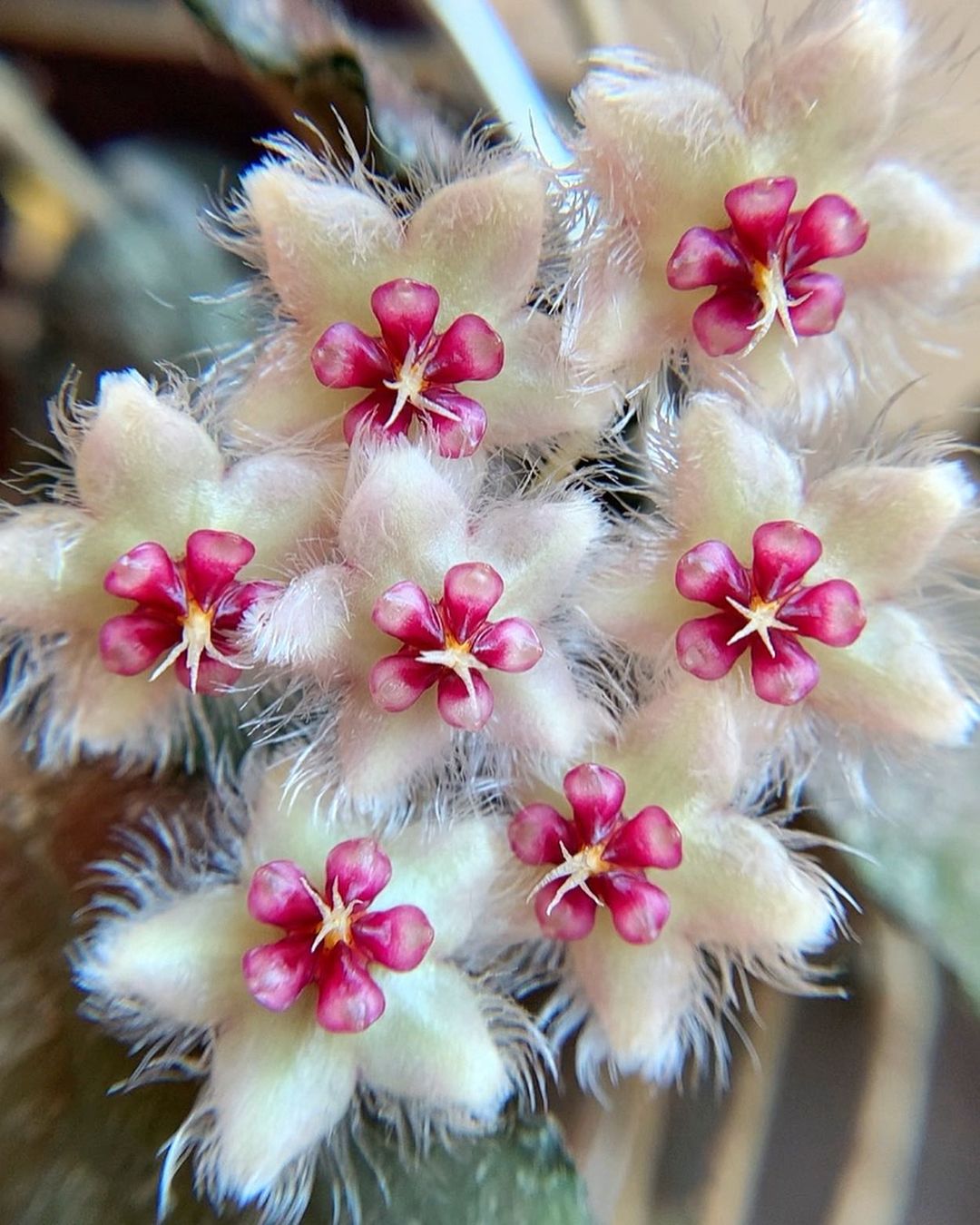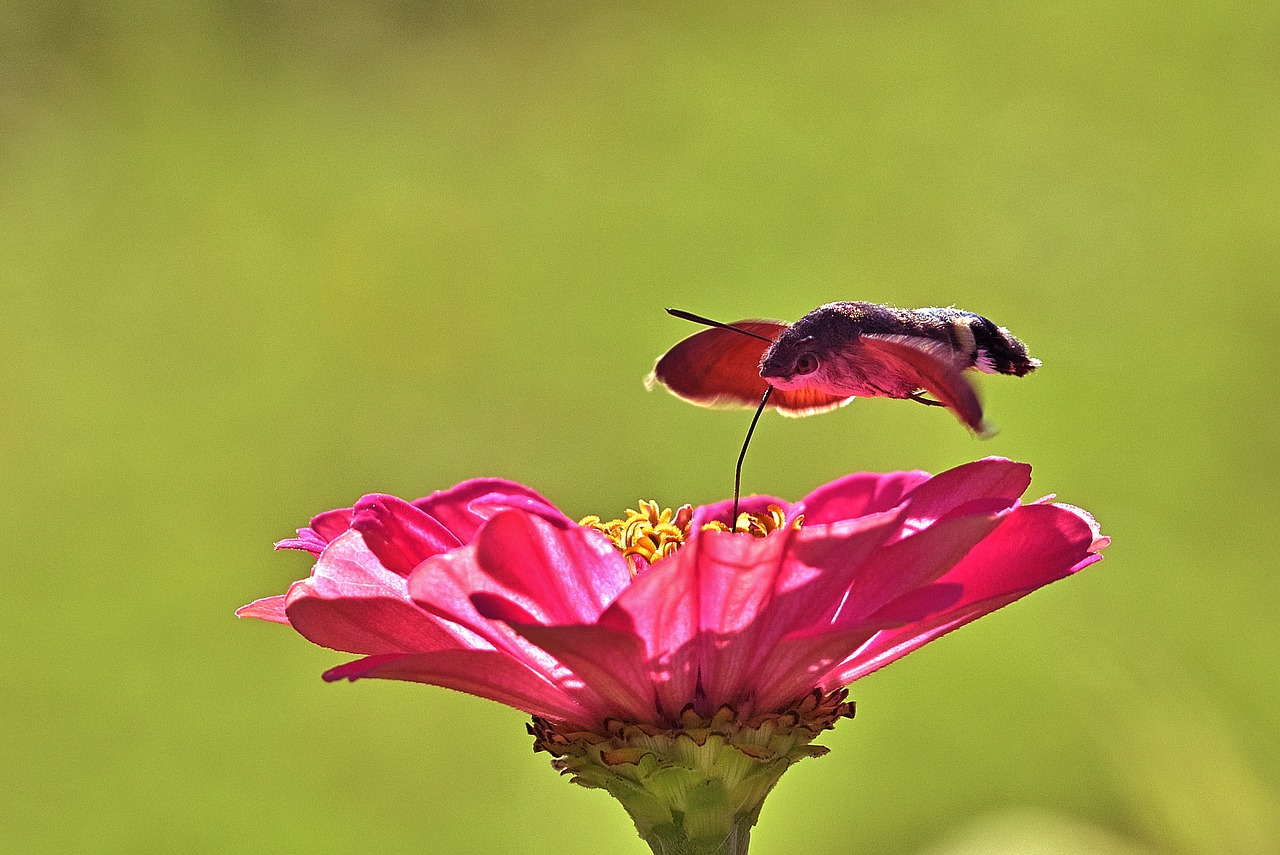Learn Everything About Growing and Caring Hoya Caudata Sumatra in this easy, comprehensive guide for a thriving plant.
Explore Everything About Growing and Caring Hoya Caudata Sumatra with expert tips. This ultimate guide covers all aspects of a successful and rewarding plant journey.
Learn How to Grow Hoya Polyneura
Hoya Caudata Sumatra Profile
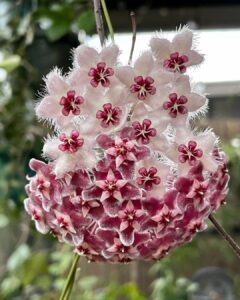
Hoya Caudata Sumatra, also known as Hoya Caudata, is a climbing plant that belongs to the Apocynaceae family. It was founded by Thomas Hoya in 1883. This unique wax plant has green leaves with a touch of red, covered in a waxy layer and small silver spots. It produces pretty, hairy flowers in shades of cream to pink, which smell like vanilla.
This tropical plant comes from warm areas in southern Thailand, Singapore, Sumatra, Peninsular Malaysia, and Borneo. It grows on the ground in places near streams and rocks. The name “Caudata” in the plant’s name means “having a tail or caudate.”
Hoya Caudata looks great in hanging baskets due to its trailing habit.
Learn Chrysanthemum Morifolium Care
Propagating Hoya Caudata Sumatra
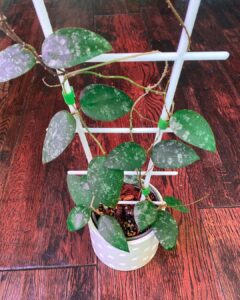
From Cuttings
- Spring or early summer is the best time to take cuttings, as the plant is actively growing.
- Choose a healthy and mature Hoya caudata Sumatra plant from which to take cuttings. Ensure it is free from pests and diseases.
- Cut a 5-6 inches long stem from the Hoya plant with a node.
- Prepare a pot with a mix of peat moss and sand.
- Plant the stem cutting in the pot.
- Water the cutting thoroughly but avoid making the soil too wet.
- Place the pot in a spot with indirect sunlight.
- Cover the pot with a plastic bag.
Wait for about 7-10 days, and roots should start to grow from the cutting.
From Leaf
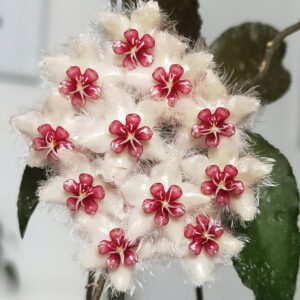
- Propagating a plant from a leaf can be challenging because not all leaves can grow into a healthy adult plant.
- Choose a healthy leaf from a mature plant. Cut it off when it meets the stem at the node.
- Let the cut end of the leaf dry for two days to form a callus.
- Plant the leaf in a pot, angling it at 45 degrees.
- After about a month, the leaf will start growing new roots in the soil.
Over the next few weeks, the leaf will grow taller, and you’ll see the first few new leaves forming at the base. You will notice the first few nodes.
From Seeds
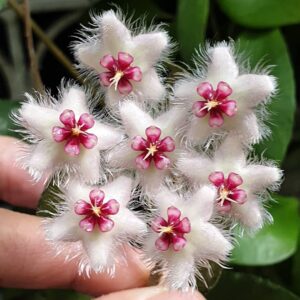
- To propagate from seeds, allow the seed pods to dry on the plant until they turn brown and crispy.
- Break open the pods to collect the seeds.
- Sow the seeds in a shallow tray with orchid or seed starting mix.
- Water the seeds adequately and place the tray in a spot with indirect sunlight.
- After about 3-4 weeks, the seeds should start germinating.
- Once you see new growth, transfer the seedlings into a suitable container.
Ideal Pot Size for Hoya Caudata Sumatra
.Opt for a pot that is slightly larger than the plant’s root ball, around 1-2 inches (2.5-5 cm) larger in diameter. Ensure the pot has drainage holes to prevent root rot. As the plant grows, gradually move it into larger pots to accommodate its size and root system.
Check Costus Barbatus Care and Growing Guide
Growing Conditions for Hoya Caudata Sumatra
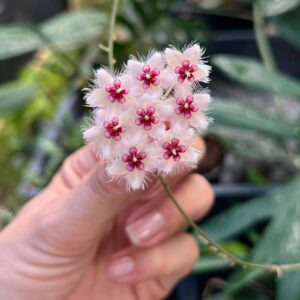
Sunlight
Choose a spot with indirect or filtered light all day long for your Hoya Caudata Sumatra. Allow it to receive 2-3 hours of mild morning sun, but make sure to protect it from direct afternoon sunlight to avoid leaf damage.
When growing this plant indoors, place it near a south or north-facing window. If natural light is insufficient, you can use fluorescent lighting as a substitute.
Soil
Hoya Caudata prefers moist, well-draining soil. The best potting mix is a combination of equal parts perlite, peat, and orchid mix. You can also include charcoal or fir bark in the mix if you want. The ideal soil pH should be between 6.1 and 7.5.
Water
Water Hoya Caudata Sumatra when the topsoil becomes slightly dry. Avoid watering it every day, as this can cause root rot. Before watering, always check if the soil is dry or not, and give enough time between waterings.
Temperature and Humidity
Hoya Caudata Sumatra likes temperatures between 60-95°F (15-35°C). Avoid exposing it to very high temperatures, which can harm the leaves. In winter, keep the plant away from drafty windows and doors.
This plant thrives in high humidity, ideally between 60-80%. If the air in your room is dry, you can use a humidifier or place the pot on a tray with water and pebbles to increase the humidity.
Check Skeleton Flower Growing and Care Guide
Hoya Caudata Sumatra Care
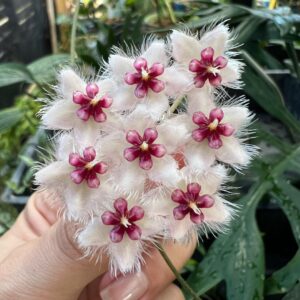
Fertilizer
Use a liquid fertilizer rich in nitrogen during the growing season. Once the plant begins to flower, switch to a fertilizer high in phosphorus to support its blooming phase. Remember to fertilize the plant from spring through summer but avoid feeding it during fall and winter.
TIP: For additional benefits, consider adding worm castings or compost, as they provide an all-around boost to the plant’s health.
Re-potting
Hoya Caudata Sumatra prefers a slight root-bound state. Only repot the plant when you see many roots coming out from the top of the soil. Do this during early spring to summer and choose a container that is just one size larger than the previous one.
Pests and Diseases
Watch out for pests like spider mites, scales, thrips, aphids, and mealybugs, as they can harm Hoya Caudata. If you notice these bugs, separate the affected plant from others to prevent them from spreading. Trim away the infested parts using pruning shears and treat the plant with an organic insecticide to eliminate the pests.
Also, be cautious not to overwater your plant, as it can lead to root rot and damage the plant’s roots.
Check Philodendron Orange Marmalade Care and Growing Guide
Hoya Caudata Sumatra – Toxicity
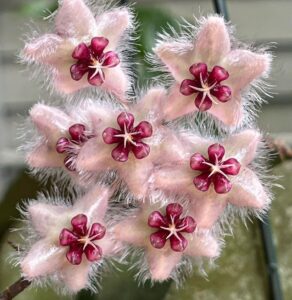
The sap of Hoya Caudata Sumatra is slightly poisonous and can cause stomach problems and skin irritation. Therefore, it’s important to keep it away from pets and children. The safest option is to plant it in hanging baskets, which will be out of their reach.
Check Esperanza Plant Growing and Care Guide
FAQs
Q.1. How do I prune my Hoya Caudata Sumatra?
Prune your Hoya Caudata Sumatra to remove dead or unhealthy growth and to maintain its shape and size. Trim the plant after flowering to encourage new growth.
Q.2. How can I encourage Hoya Caudata Sumatra to bloom?
To encourage blooming, provide the plant with ample indirect light, appropriate watering, feed with well-balanced fertilization, and keep the plant in a slight root-bound state during the growing season. Blooms typically appear on mature plants with proper care.
Q.3. Can I keep Hoya Caudata Sumatra indoors?
Yes, you can keep Hoya Caudata Sumatra indoors. Place it near a south or north-facing window to provide sufficient light. If natural light is limited, you can use fluorescent lighting to supplement it.

